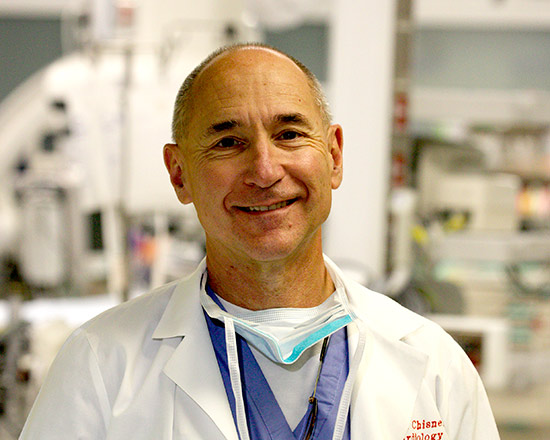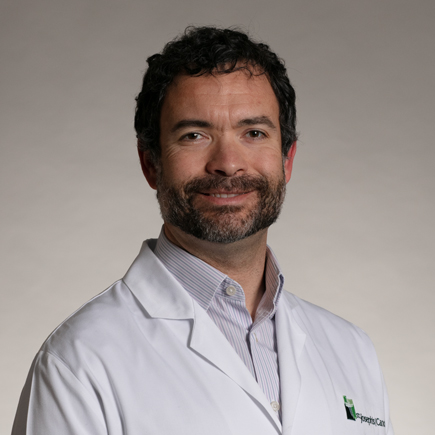
Request an appointment
Scheduling an appointment with one of our electrophysiologists is easy. Simply fill out our online request form to take the first step toward better heart health.
Physicians and other health care providers providing services through the SJ/C Physician Network may be independent contractors and not employees or agents of the SJ/C Physician Network, St. Joseph’s/Candler Health System or its affiliated entities. Each such physician or other health care provider is responsible for their own actions and the SJ/C Physician Network, St. Joseph’s/Candler Health System and its affiliated entities are not and shall not be liable for the acts or omissions of any such physicians or health care providers.

When it comes to your heart’s rhythm, precision matters. Within St. Joseph’s/Candler Physician Network Cardiology, our specialized team of electrophysiologists (EPs) is dedicated to detecting, diagnosing and treating heart rhythm disorders with groundbreaking technology and a patient-collaborative care approach. Whether you're experiencing palpitations, irregular heartbeats or a diagnosed arrhythmia, we provide expert care designed for you, in partnership with you and your clinical needs.
The heart beats due to electrical impulses that cause it to contract and relax, pumping oxygen-rich blood to vital organs. When these impulses become irregular, the heart may beat too slowly, too fast or in an unpredictable pattern—conditions known as arrhythmias. These electrical abnormalities are more common than many realize and, without proper treatment, can lead to serious complications such as stroke or heart failure.
With the increasing prevalence of arrhythmias, including atrial fibrillation (AFib)—the most common type—our Advanced Heart Rhythm Center was established to provide pioneering treatments in collaboration with the region’s top heart specialists. Our goal is to restore your heart’s rhythm and improve your overall health with minimally invasive, highly effective procedures.
Dr. Michael Chisner and Dr. Daniel Cobb see patients at their southside office across from St. Joseph's Hospital:
11700 Mercy Boulevard, Plaza D, Suite 1B
Savannah, Ga. 31419
912-927-3434
When it comes to heart rhythm disorders, precision and expertise make all the difference. Our electrophysiology services offer advanced diagnostics and treatments for arrhythmias, atrial fibrillation, and other electrical disturbances of the heart.
Non-invasive electrophysiology procedures:
Each of these procedures is performed using the latest technology to ensure precision, safety and the best possible recovery outcomes for our patients.
A pacemaker is a small, battery-operated device implanted under the skin, typically near the collarbone, to regulate slow or irregular heart rhythms. It works by sending precise electrical signals to the heart, ensuring it beats at a normal and steady rate. Pacemakers are often recommended for patients experiencing bradycardia (slow heartbeat), heart block, or other conduction disorders that cause fatigue or fainting. Modern pacemakers are highly advanced, with some capable of adjusting heart rates based on activity levels and storing important data about heart function. This life-enhancing device helps patients regain energy, improve circulation and reduce symptoms associated with abnormal rhythms.
An Implantable Cardioverter Defibrillator (ICD) is a life-saving device designed to detect and correct dangerous heart rhythms, particularly those that can lead to sudden cardiac arrest. Unlike a pacemaker, which regulates slow heart rates, an ICD continuously monitors for life-threatening arrhythmias such as ventricular tachycardia or ventricular fibrillation. When it detects a severe irregularity, the device delivers a precisely timed electrical shock to restore a normal rhythm and prevent cardiac arrest. ICDs are critical for patients at high risk of sudden cardiac events due to conditions like heart failure, prior cardiac arrest or genetic heart disorders. This advanced technology offers peace of mind, ensuring the heart remains stable and significantly reducing the risk of sudden cardiac death.
Cardiac ablation is a minimally invasive procedure used to treat arrhythmias by targeting and eliminating heart tissue that produces abnormal electrical signals. Ablation is particularly effective for conditions like atrial fibrillation (AFib), supraventricular tachycardia (SVT), and ventricular tachycardia that do not respond well to medication. The procedure is performed using thin, flexible catheters inserted through a vein and guided to the heart with imaging technology, making it a safe and highly effective treatment option. Many patients experience a significant improvement in symptoms, reduced reliance on medication and an enhanced quality of life following ablation.
The Watchman Device is a groundbreaking implant designed to reduce stroke risk in patients with atrial fibrillation (AFib) who cannot safely take blood thinners. In AFib, blood can pool in a small pouch in the heart called the left atrial appendage (LAA), increasing the risk of clot formation and stroke. The Watchman is implanted via a catheter-based procedure and permanently seals off the LAA, preventing clots from escaping into the bloodstream. This device provides an alternative to long-term anticoagulation therapy for patients at high risk of bleeding complications. With a short recovery time and a proven track record of stroke prevention, the Watchman Device offers a life-changing solution for AFib patients seeking a safer, more permanent way to protect their health.

Cardiology Internal Medicine Clinical Cardiac Electrophysiology Cardiovascular Disease
If you or a loved one is experiencing symptoms of an irregular heartbeat—such as dizziness, palpitations, or shortness of breath—our team is here to help get your heart back into rhythm. Early detection and treatment of arrhythmias can prevent serious complications and significantly improve your well-being. Your heart’s rhythm matters—trust the experts at St. Joseph’s/Candler to keep it on track.